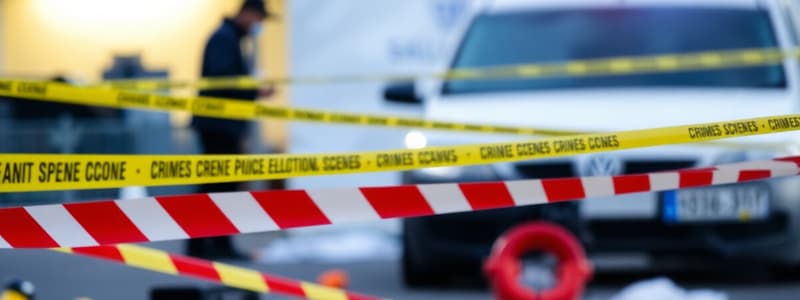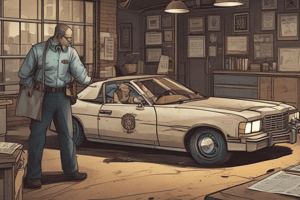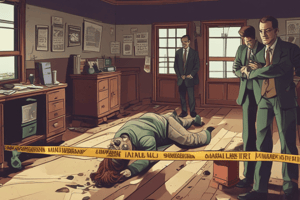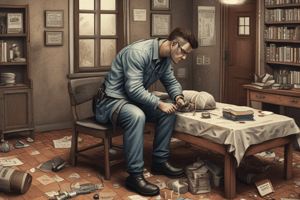Podcast
Questions and Answers
Which laboratory was established first in Canada following the Locard model?
Which laboratory was established first in Canada following the Locard model?
- Reginal laboratory in Sault Ste. Marie
- Centre of Forensic Sciences
- Laboratory of the Attorney General in Ontario (correct)
- Toronto Police Service Crime Laboratory
What is one of the roles of scientists working in forensic laboratories?
What is one of the roles of scientists working in forensic laboratories?
- Conducting criminal investigations
- Serving as law enforcement officers
- Formulating legal statutes
- Analyzing evidence (correct)
What does accreditation of forensic laboratories ensure?
What does accreditation of forensic laboratories ensure?
- Increased funding from the government
- Uphold quality assurance and control (correct)
- Compliance with statistical analysis
- Reduction in laboratory workload
Which of the following is NOT a service typically provided by a full-service forensic laboratory?
Which of the following is NOT a service typically provided by a full-service forensic laboratory?
Which term describes the pattern of behavior exhibited by an offender?
Which term describes the pattern of behavior exhibited by an offender?
What is the primary role of forensic science in crime scene investigation?
What is the primary role of forensic science in crime scene investigation?
Which of the following is NOT an objective of crime scene investigation?
Which of the following is NOT an objective of crime scene investigation?
The CSI Effect refers to what common misconception?
The CSI Effect refers to what common misconception?
What is a necessary aspect of crime scene investigation?
What is a necessary aspect of crime scene investigation?
What is the primary responsibility of a uniformed patrol officer?
What is the primary responsibility of a uniformed patrol officer?
What title is typically held by the officer who supervises patrol officers?
What title is typically held by the officer who supervises patrol officers?
Which historical period is often credited with the early roots of forensic science?
Which historical period is often credited with the early roots of forensic science?
Which of the following roles is responsible for preparing a case for court?
Which of the following roles is responsible for preparing a case for court?
How does the portrayal of forensics in 'CSI' differ from other police procedural shows?
How does the portrayal of forensics in 'CSI' differ from other police procedural shows?
What is emphasized in the methodological process of crime scene investigation?
What is emphasized in the methodological process of crime scene investigation?
What distinguishes Crime Scene Investigators in Canada from civilian assistants?
What distinguishes Crime Scene Investigators in Canada from civilian assistants?
Which type of evidence is crucial for the reconstruction of a crime?
Which type of evidence is crucial for the reconstruction of a crime?
Which statement is true regarding Forensic Identification Assistants?
Which statement is true regarding Forensic Identification Assistants?
Which aspect is NOT part of the responsibilities of forensic scientists during crime scene investigations?
Which aspect is NOT part of the responsibilities of forensic scientists during crime scene investigations?
What was a significant development in policing established by Henry Fielding in 1750?
What was a significant development in policing established by Henry Fielding in 1750?
What method did the watch-and-ward system employ?
What method did the watch-and-ward system employ?
Who is considered the 'Father of modern criminology'?
Who is considered the 'Father of modern criminology'?
Which term refers to the study of evidence for investigating crimes?
Which term refers to the study of evidence for investigating crimes?
What concept is represented by the belief that criminals are born due to biological deviance?
What concept is represented by the belief that criminals are born due to biological deviance?
What was the first formal detective agency, founded by Eugène François Vidocq in the 19th century?
What was the first formal detective agency, founded by Eugène François Vidocq in the 19th century?
What role did the Metropolitan Police of London established in 1829 primarily serve?
What role did the Metropolitan Police of London established in 1829 primarily serve?
What did Alexandre Lacassagne contribute to the field of criminology?
What did Alexandre Lacassagne contribute to the field of criminology?
What is a primary benefit of creating a floor plan sketch?
What is a primary benefit of creating a floor plan sketch?
When is it appropriate to prepare a final (finished) sketch?
When is it appropriate to prepare a final (finished) sketch?
Which method of measurement is considered the least accurate?
Which method of measurement is considered the least accurate?
What is a requirement when conducting measurements using the triangulation method?
What is a requirement when conducting measurements using the triangulation method?
Which type of sketch would be best to illustrate the vertical arrangement of items at a crime scene?
Which type of sketch would be best to illustrate the vertical arrangement of items at a crime scene?
Why is the sketching of a crime scene often conducted last?
Why is the sketching of a crime scene often conducted last?
What does the chain of custody ensure regarding evidence submitted to court?
What does the chain of custody ensure regarding evidence submitted to court?
What type of plan provides a bird’s eye view of outdoor scenes?
What type of plan provides a bird’s eye view of outdoor scenes?
Which of the following items is NOT typically included in every sketch documentation block?
Which of the following items is NOT typically included in every sketch documentation block?
What is a significant characteristic of cross-sectional plans?
What is a significant characteristic of cross-sectional plans?
Flashcards are hidden until you start studying
Study Notes
Crime Scene Investigation
- A methodical process that adheres to set guidelines.
- A dynamic and thoughtful process relying on experience and observation.
- Rooted in the scientific method.
Objectives of Crime Scene Investigation
- Recognize and identify forensic evidence.
- Collect and preserve evidence.
- Reconstruct the crime.
- Assist in the formation of a theory about the crime.
The CSI Effect
- An unrealistic expectation about the capabilities of forensics and crime scene investigations.
- A result of inaccurate depictions of evidence in media, including the rules and responsibilities of law enforcement, the nature of evidence, and procedures.
Roots of Criminal Investigation
- Forensic science is a relatively new career field traced back to approximately 1248.
- It has an interdisciplinary nature, with pioneers in related fields influencing its development.
- Early clan life involved 'Kin policing,' where clan members determined punishments for violators.
- Ancient Hebrews assigned law enforcement responsibilities to kings, high priests, and elders.
- Ancient Babylon codified laws into the 'Laws of Hammurabi,' which introduced the idea of juvenile versus adult court systems.
History of Criminal Investigation - Policing
- The 1750s saw Henry Fielding's establishment of the Bow Street Runners in London, England, who acted as "thief takers" and often accepted cases only from those who could afford the fees.
- The Bow Street Runners were the first professional police force and established practices still in use today, such as hiring informants and conducting criminal raids.
- The Metropolitan Police of London was founded in 1829, followed by the establishment of an investigative unit in 1842.
- The French Sûreté, founded by Eugène François Vidocq in 1810, was the first formal use of detectives in modern times. Vidocq's belief that "only criminals can fight crime" led to the use of undercover investigators in prisons.
- North America saw the implementation of formal, uniformed policing, beginning in Toronto in 1834, Montreal in 1838, and Quebec City in 1840.
- Provincial police forces emerged in rural Eastern Canada in 1867, followed by expansion into the North and West, with the North-West Mounted Police established in 1873.
History of Criminal Investigation - Criminology vs Criminalistics
- Criminology focuses on the study of crime within society and the exploration of criminals and their treatment.
- Criminalistics, also known as forensic science, involves the study of evidence to investigate crimes.
History of Criminal Investigation - Philosophies in Criminology
- Atavism: Cesare Lombroso, considered the "father of modern criminology," believed criminals were born to commit crimes due to biological deviance.
- Positivism: Alexandre Lacassagne, known as the "father of forensic science," believed criminality resulted from social causes.
History of Criminal Investigation - Impact of Criminology on Criminalistics
- The work of Wilfrid Derome, who established the first forensic science laboratory in Canada, followed the Locard model.
Development of Forensic Labs in Canada
- The first forensic science laboratory in Canada was established in Toronto (1932), initially named the Laboratory of the Attorney General in Ontario.
- The laboratory was later renamed to the Centre of Forensic Sciences in 1966.
- The Centre of Forensic Sciences has a central laboratory in Toronto and a regional laboratory in Sault Ste. Marie.
The Crime Lab
- Scientists employed in crime labs are typically civilians who analyze evidence and testify in court.
- A full-service laboratory includes various departments, including toxicology, biology, firearms and toolmarks examination, questioned documents, photo analysis, electronics, and chemistry.
- Crime labs operate under established protocols and guidelines to ensure the integrity of scientific analyses.
- Laboratories can become accredited (legally recognized) through organizations such as the American Society of Crime Laboratory Directors, upholding quality assurance and quality control.
Defining Crimes and a Crime Scene
- A crime is an act punishable by law, deemed a public wrong.
- All crimes are different but may display patterns, which for the offender is known as the modus operandi (Mode of Operation).
Crime Scene Investigators in Canada
- Highly trained, sworn police officers called "Identification Officers."
- May work as general duty, uniformed police officers, Scene of Crime Officers (SOCO), or Identification Officers.
- Civilians can assist in crime scene investigation:
- Civilian: Someone who has not completed formal police training. They work with police but are sworn.
- Forensic Identification Assistants: Assists Identification Officers in processing evidence (e.g., Crime Scene Support Techs in Toronto).
Sketching the Crime Scene
- Creates a permanent record of the crime scene and evidence, using units of measurement.
- Routine in major crimes, discretionary for other crimes.
- Two types of sketches:
- Rough sketch: A preliminary sketch often done during the initial walkthrough.
- Final (finished) sketch: Prepared for presentation in court based on the rough sketch.
Types of Sketches
- Floor Plan: A two-dimensional sketch providing a bird's-eye view of a room or series of rooms.
- Elevation Plan: A two-dimensional sketch used when the vertical plane is of interest.
- Site Plan: A two-dimensional sketch providing a bird's-eye view of outdoor scenes.
- Cross-Sectional Plan: Also known as "exploded view" or "cross-projection" sketch, combining floor plan and elevation.
Measurements
- All sketches contain measurements.
- Measurements may be taken last as they can be intrusive.
Methods of Measurement
- Triangulation: Measuring the distance from two fixed points to the location of evidence, best for outdoor scenes or tricky contexts (requires multiple people).
- Baseline: Measuring the distance of an object from a baseline at a right angle, best for indoor or outdoor scenes (requires multiple people).
- Polar Coordinates: Also referred to as "map and compass." It involves sighting evidence from a fixed point and measuring its distance and direction (best over large distances, requires two people).
- Perspective Grid Method (Photogrammetry): Places an object of known measurements within a photograph, requiring overlapping photos from multiple angles to limit distortion (requires specialized software).
Chain of Custody
- Essential to prove the integrity of evidence submitted to court; otherwise, it may be deemed inadmissible.
- Must detail the collection process, including who collected the evidence, when it was collected, and where it was collected.
Studying That Suits You
Use AI to generate personalized quizzes and flashcards to suit your learning preferences.




